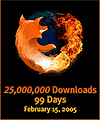Steve Outing has a good, yet short, article about communication services (think Net access, cable TV, Dish TV, cell phones).
Obstensively, the article talks about how newspapers may get the short straw in the rush to get other communication/data subscriptions: News has become a commodity – so newspapers may well be cancelled in favor of, for example, NetFlix or whatever for those without unlimited budgets.
Newspapers have already become aware of this – slowly, but they are adopting and adapting (see Dan Gillmor’s blog on any given day for more on this). Large newspaper companies are starting to experiment with free newspapers for commuters and other city dwellers, betting the ad revenue for this non-subscription product will be great, as the target audience’s appeal to advertisers – younger, professional, conspicuous consumers – will feed the coffers.
Papers have also begun to embrace the blog mentality – that’s content that IS unique to a Web site. When Gillmor was at the San Jose Mercury – blogging daily for their Silicon Valley property – I’d read him daily. And there’s those ad impressions….
But the article also touched on the idea of “bundling” services (as Comcast has done with their Triple Play – VoIP, TV and Internet), but didn’t explore it much.
Bears more thought, methinks.
What are some of those thoughts? Consider the following:
- For the average consumers, a package is usually easier to consume than hand-picking parts to make a custom package. And there are far more average consumers than the opposite.
- Packages usually keep costs down. A Triple Play type package is usually cheaper than three subscriptions from different companies. That said, such packages often make people purchase what they don’t really need (“Gee, I don’t need high-speed internet, but for only $5 extra a month…”).
- So – as consumers – we need to make sure that unbundling – or lack of bundling – is supported. Who wants to go through a Microsoft-type lockin for communications/data subscriptions? Not me, that’s for sure.
- Related the the previous point: Bundling can be a good thing, but it can lead to monopolies, or – at least – a handful of large companies. There are upsides and downsides to such consolidation, but it bears watching. The rapid consolidation of the telco industry in the recent past (seems like there’s a $XX billion merger every other day) is both troubling (lack of choice) and welcome (telcos are so f’d up, some consolidation is welcomed).
- Outing is really talking – to a degree – about the end to traditional print media as we have known it. While print won’t disappear, it will be marginalized. Looks at the precedent of networkTV news dominance: CNN was scoffed at, but now is the first place the White House turns (OK, maybe FOX News first…). Talk radio came out of nowhere to be a right-wing staple, getting the message out. Then this thingee called the internet…with online news, blogs… To quote Bobby Zimmerman, the times (including the New York Times) they are a changin’.
- I’m a big reader, yet I’m also a huge computer dork. And I now subscribe to less magazines than at any post-high school point of my life, and that includes times when I really didn’t have a lot of money to spend on non-essentials. There’s little need for them for news – be it computer or world news. By the time it’s in print, I’ve read about it extensively online.
- I still subscribe to a newspaper, but I read it less and less. And I know very few (if any) younger co-workers who even subscribe.
- The explosion of data/delivery systems is great in that there is a lot of [whatever] out there. That doesn’t mean there is a whole lot of good stuff out (by any measure).
What this all means today, tomorrow or next decade I can’t say.
But it’s all a way different way of looking at a lot of things – data, content, delivery and distribution systems – than were not really even on the radar a decade ago.



